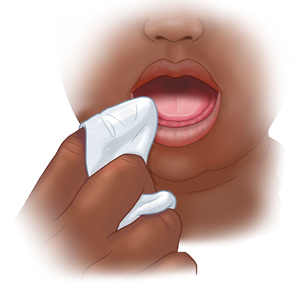Most pediatric dentists will agree that regular dental care should begin when a child gets their first tooth or no later than the child's first birthday. Most children should have a dental check-up at least twice each year after that. Some children may need evaluations and care more often. Experts advise the following:
Birth to age 6 months
-
Clean the baby's mouth with gauze or use a soft infant toothbrush after feedings and at bedtime.
-
Talk with your child's healthcare provider about fluoride supplements if you live in an area without fluoridated water.
-
Regulate feeding habits (bottle-feeding and breastfeeding).
Ages 6 to 12 months
-
During this time, the first tooth should appear. Talk with a pediatric dentist for an exam.
-
Ask about fluoride varnish that may be applied to the teeth every 3 to 6 months.
-
Brush teeth after each feeding and at bedtime with a small, soft-bristled brush and a small amount of fluoride toothpaste, about the size of a grain of rice.
-
As the child begins to walk, stay alert for possible dental or facial injuries.
Ages 12 to 24 months
-
Follow the schedule of dental exams and cleanings, as recommended by your child's pediatric dentist. Generally, dental exams and cleanings are advised every 6 months for children and adults.
-
As your child learns to rinse and spit, brushing with a small amount (about the size of a grain of rice) of fluoridated toothpaste is appropriate, in most cases.
Facts about baby teeth
-
Correct care of a child's baby teeth (primary teeth) is very important, as these teeth hold space for the future eruption of permanent teeth.
-
If a baby tooth decays or is removed too early, the space needed for the permanent teeth is lost. It can only be regained through orthodontic treatment.
-
Infected baby teeth can cause the permanent teeth to develop incorrectly. This can cause stains, pits, and weaker teeth.
-
Primary teeth are important in speech development.
-
Primary teeth aid in chewing food correctly, promoting healthy nutrition.
-
Most children begin losing their baby teeth around the ages of 5 or 6, often with the front teeth first. They continue to lose baby teeth until the age of 12 or 13. This is when all the permanent teeth finally come through, except for the third molars (wisdom teeth). These molars begin to appear around ages 17 to 21.
Diet and dental care for children
The American Academy of Pediatric Dentistry advises the following to make sure that your child eats correctly to maintain a healthy body and teeth:
-
Ask your child's pediatric dentist to help you assess your child's diet.
-
Shop smart. Don't stock your pantry with sugary or starchy snacks.
-
Buy "fun foods" just for special times.
-
Limit the number of sugary snacks and choose nutritious snacks.
-
Provide a balanced diet and save foods with sugar or starch for mealtimes.
-
Don't put your young child to bed with a bottle of milk, formula, or juice.
Featured in


